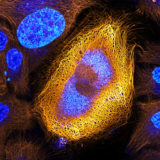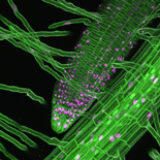
Are you on X?
Follow Nikon Instruments for microscopy news and trends, updates on new products, and information on contests and promotions.
October 04, 2017, via Nikon Small World

Nikon Instruments Inc. today continues celebrating its 100th anniversary by unveiling the winners of the 43rd annual Nikon Small World Photomicrography Competition, with Dr. Bram van den Broek of The Netherlands Cancer Institute (NKI) taking first place for his photo of a skin cell expressing an excessive amount of keratin. He came across this peculiar but beautiful skin cell while researching the dynamics of keratin filaments with Andriy Volkov, a student in the Cell Biophysics group led by Professor Kees Jalink.
Learn More @ Nikon Small World
October 04, 2017, via Nobel Prize
Check out this year's Nobel Prize winners! Special shout-outs to Jeffrey C. Hall, Michael Rosbash and Michael W. Young, recipients of the Nobel Prize in Medicine or Physiology for their timeless work on circadian rhythm!
Learn More @ Nobel Prize
September 28, 2017, via Nikon Instruments
Nikon is happy to announce a workshop on Seamless Imaging: Widefield – Confocal – Super-resolution at Goethe-Universität in Frankfurt, Germany from October 10-13. Bring your favorite sample and try out all three imaging techniques on the same Ti2 microscope! Please also join us for a talk on imaging techniques by Dr.s Klaus Nettesheim and Simone Lepper, followed by an application-specific talk by Dr. Guido Wabnitz (Heidelberg University).
Learn More @ Nikon Instruments
September 27, 2017, via Nikon Instruments
Announcing the latest breakthrough in confocal imaging: the A1R-HD resonant scanner from Nikon! This new high definition and low noise resonant scanner yields similar image quality as traditional galvo scanners (image below) and can now scan up to a 1k x 1k area.
Learn More @ Nikon Instruments
September 26, 2017, via Nature Scientific Reports
Differentiation of induced pluripotent stem cells (iPSCs) into neural progenitor cells (NPCs) is well documented, but new research in Scientific Reports describes in detail the transition of iPSC-dervied NPCs into functional neurons.
Learn More @ Nature Scientific Reports
September 21, 2017, via Nikon Small World

Nikon Instruments Inc. today unveiled the winners of the seventh annual Nikon Small World in Motion Photomicrography Competition, awarding First Place to Daniel von Wangenheim from the Institute of Science and Technology Austria for his time lapse video following the root tip of Arabidopsis thaliana (also known as the Thale cress). The video reflects a time lapse of 17 hours and approximately 4mm of growth. Von Wangenheim and his colleagues are studying how plants perceive and respond to gravity.
Learn More @ Nikon Small World
September 15, 2017, via California Institute of Technology Jet Propulsion Laboratory
On October 15th, 1997 Cassini was launched into space on its voyage to Saturn. Now more than 18 years and countless images later the mission has come to a close. Click to check out the amazing final images.
Learn More @ California Institute of Technology Jet Propulsion Laboratory
September 14, 2017, via Nature Scientific Reports
New work in Scientific Reports finds that many bivalves do not adjust to changes in ocean acidification over multiple generations. Climate change is thus likely to have a continued and severe impact on populations. Imaging for this study was performed with the help of a Nikon digital camera.
Learn More @ Nature Scientific Reports
September 14, 2017, via Nature Biomedical Engineering
Research in Nature Biomedical Engineering reports the development of a new dendrimer for the treatment of cancer by depletion of bioavailable copper. Confocal imaging was performed with a Nikon A1R microscope.
Learn More @ Nature Biomedical Engineering
September 13, 2017, via Nature Cell Biology
Research in Nature Cell Biology illuminates how myofibrils squeeze the nucleus towards periphery of myofibres. Imaging was performed with help of a Nikon Ti inverted microscope.
Learn More @ Nature Cell Biology
September 12, 2017, via Nature Scientifc Reports
Colocalization of Syntaxin 1A and L-type voltage-gated calcium channel resolved with help of Nikon N-STORM Super-Resolution Microscope System.
Learn More @ Nature Scientifc Reports
September 11, 2017, via Cell Chemical Biology
A new fluorescent mitochondrial superoxide probe, MitoNeoD, is published in Cell Chemical Biology! Imaging was performed with a Nikon A1R confocal microscope.
Learn More @ Cell Chemical Biology
September 04, 2017, via Nature Methods
New Janelia Fluor dyes utilize 3-substituted azetidine functional groups, allowing for precise tuning of spectral and chemical properties.
Learn More @ Nature Methods
September 01, 2017, via Nature Microbiology
Nikon's super-resolution N-SIM and custom STORM system illuminates the 3D structure of the ciliary transition zoney. This research has broad implications for the treatment of ciliopathies, such as Meckel Syndrome.
Learn More @ Nature Microbiology
September 01, 2017, via Nikon Instruments
Nikon Instruments has a new position open for a Biosystems Technical Specialist! This position is based in New York and the primary responsibility is troubleshooting advanced imaging product lines, with about 25% travel.
Learn More @ Nikon Instruments
August 31, 2017, via Biophysical Journal
Epithelial cells grown on viscoelastic substrates found to aggregate and form cell-free areas in a process driven by vinculin translocation. Imaging was performed using a Nikon A1R confocal microscope and BioStation IM-Q live cell incubation and monitoring system.
Learn More @ Biophysical Journal
August 30, 2017, via Nature Microbiology
Chikungunya virus outbreaks have made the news with worldwide outbreaks, but new research in Nature Microbiology shows that infection activates the NLRP3 inflammasome, and provides a pathway for therapeutic solutions. Confocal imaging was performed using a Nikon A1R.
Learn More @ Nature Microbiology
August 29, 2017, via Cell
Did you know that leprosy is caused by Myobacterium leprae? New research details how M. leprae infection of macrophages leads to demyelination and axon damage in nerve cells. Imaging was performed in part with a Nikon A1 confocal microscope.
Learn More @ Cell
August 26, 2017, via Optical Society of America
New multi-focal SIM technique improves volumetric imaging speed by an order of magnitude.
Learn More @ Optical Society of America
August 25, 2017, via Nature Medicine
New research in Nature Medicine shows that elimination of senescent cells in mice results in higher bone mass and other benefits. Fluorescence imaging was performed using a Nikon Ti inverted microscope.
Learn More @ Nature Medicine
















